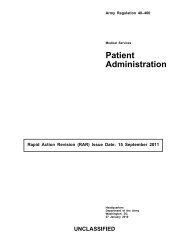AR 600-20, Army Command Policy - Army Publishing Directorate ...
AR 600-20, Army Command Policy - Army Publishing Directorate ...
AR 600-20, Army Command Policy - Army Publishing Directorate ...
Create successful ePaper yourself
Turn your PDF publications into a flip-book with our unique Google optimized e-Paper software.
(4) Participate in training as required. Determine SAPR training needs of your agency by monitoring each alleged<br />
sexual assault incident. Identify training requirements to the S<strong>AR</strong>B.<br />
(5) Conduct ongoing reviews of MOA with other Services and civilian agencies regarding SAPR support. Provide<br />
updates to the S<strong>AR</strong>B and recommendations for improvements as necessary.<br />
Appendix G<br />
<strong>Army</strong> Sexual Assault Prevention and Response Program Sexual Assault Victim Assistance<br />
Actions<br />
G–1. Responsibility for actions after a report of sexual assault<br />
Although the commander has significant leadership responsibility for actions after a report of sexual assault, not<br />
necessarily all of the actions listed in paragraph G–2 will be taken by the commander.<br />
G–2. Actions to be taken in the event of receiving a report of sexual assault<br />
The actions in the following list are to be taken in the event of receiving a report of sexual assault:<br />
a. Ensure the physical safety of the victim-determine if the alleged assailant is still nearby and if the victim needs<br />
protection.<br />
b. Advise the victim of the need to preserve evidence (for example, by not bathing, showering, washing garments).<br />
c. Encourage the victim to report the incident and get a medical examination immediately (even if the incident<br />
occurred prior to the past 72 hours).<br />
d. Make appropriate administrative and logistical coordination for movement of victim to receive care. (Involve the<br />
minimum number of personnel possible and only on a need-to-know basis).<br />
e. Ask if the victim needs a support person (for example, a personal friend, VA, chaplain) to immediately join the<br />
victim.<br />
f. Notify the S<strong>AR</strong>C.<br />
g. Notify the Chaplain if the victim requests pastoral counseling or assistance.<br />
h. Notify the Criminal Investigation <strong>Command</strong>, military police, installation provost marshal (per <strong>AR</strong> 195–1, paragraph<br />
6), and commanders in the chain of command (as appropriate) within 24 hours (as soon as the victim’s safety is<br />
established and victim’s medical treatment procedures are in motion) and—<br />
(1) Limit the details regarding the incident to only those personnel who have a legitimate need to know.<br />
(2) Take action to safeguard the victim from any formal or informal investigative interviews or inquiries, except by<br />
those personnel who may have a “need to know”, including but not limited to, the Criminal Investigation <strong>Command</strong><br />
investigator(s) and the trial counsel.<br />
(3) Collect only the necessary information (for example, victim’s identity, location and time of the incident, name<br />
and/or description of offender(s)). Do not ask detailed questions and/or pressure the victim for responses.<br />
i. Ensure the victim is made aware of, and encouraged to exercise, their options during each phase of the medical,<br />
investigative, and legal processes.<br />
j. Ensure the CID notifies victims and witnesses of their rights through a completed Victims and Witnesses of Crime<br />
form, DD Form 2701. (Reference <strong>AR</strong> 27–10).<br />
k. Inform the victim of the resources in theater that are available through the Victim and Witness Assistance<br />
Program (<strong>AR</strong> 27–10). Also, inform the victim of resources accessible from anywhere in the world (that is, Military<br />
One Source (from U.S.: 1–800–464–8107; International: 800–464–81077; International collect: 484–530–5889, 24hours-a-day,<br />
7-days-a-week)).<br />
l. Provide emotional support to the victim, including—<br />
(1) Throughout the investigation, consult with the victim and, to the extent practicable, accommodate the victim’s<br />
wishes, as long as a full and complete investigation is not compromised.<br />
(2) Listen/engage in quiet support of the victim, as needed. Be available in the weeks and months following the<br />
sexual assault, and ensure the victim that she/he can rely on the commander’s support.<br />
(3) Emphasize to the victim the availability of additional avenues of support; refer to available counseling groups<br />
and other victim services.<br />
(4) Confer with the commander’s legal representative and/or servicing SJA office to consider legal options, responsibilities<br />
(for example, pretrial restraint, military protective order), and appropriate disposition of the alleged offense.<br />
(5) If the subject is a foreign national or from a coalition force, confer with SJA on responsibilities, options, and<br />
victims rights (in theater).<br />
(6) Determine the best courses of action for separating the victim and the subject during the investigation.<br />
(a) Determine whether the victim desires to be transferred to another unit.<br />
(b) Determine if the suspect needs/desires to be transferred to another unit.<br />
<strong>AR</strong> <strong>600</strong>–<strong>20</strong> 18 March <strong>20</strong>08<br />
99
















